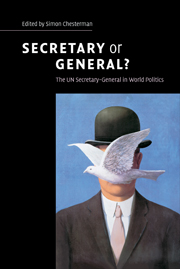Book contents
- Frontmatter
- Contents
- Contributors
- Foreword
- Acknowledgements
- Introduction: secretary or general?
- PART I Defining and refining the job description
- PART II Maintaining peace and security
- 4 Relations with the Security Council
- 5 Good offices and “groups of friends”
- 6 The bully pulpit
- PART III Normative and political dilemmas
- PART IV Independence and the future
- APPENDIX: selected documents on the Secretary-General
- Select bibliography
- Index
4 - Relations with the Security Council
Published online by Cambridge University Press: 06 January 2010
- Frontmatter
- Contents
- Contributors
- Foreword
- Acknowledgements
- Introduction: secretary or general?
- PART I Defining and refining the job description
- PART II Maintaining peace and security
- 4 Relations with the Security Council
- 5 Good offices and “groups of friends”
- 6 The bully pulpit
- PART III Normative and political dilemmas
- PART IV Independence and the future
- APPENDIX: selected documents on the Secretary-General
- Select bibliography
- Index
Summary
In his 1986 Cyril Foster Lecture at Oxford University, Javier Pérez de Cuéllar argued that in discharging his responsibilities the Secretary-General must be aware that the “idealism and hope of which the Charter is a luminous expression have to confront the narrow dictates of national policies”. The Secretary-General must walk a fine line between effective cooperation and apparent collusion with the Security Council in particular. Past incumbents have all learned – the hard way – when they have either crossed the limits of tolerance of one of the permanent members of the Council, or cleaved so close that they have sacrificed legitimacy in the eyes of their broader constituency among the member states. This requires the Secretary-General to come to terms with the geopolitical realities of the day – even as he or she attempts to reshape them. In the absence of such realism, the independent authority the Secretary-General wields may be perceived by member states as a threat, rather than as a resource, inevitably producing attacks, resistance, and even vilification – while putting at risk the effectiveness and credibility of the organization as a whole.
The seeds of tension in relations between the Secretary-General and the Security Council lie in Articles 98 and 99 of the UN Charter. As other chapters explore in more detail, these Charter provisions establish an independent political role for the Secretary-General, alongside his or her role as chief administrative officer of the organization. Article 99 is particularly significant, giving the Secretary-General a right of notice that has been parlayed over the years into the basis for initiative independent of the Security Council.
- Type
- Chapter
- Information
- Secretary or General?The UN Secretary-General in World Politics, pp. 69 - 85Publisher: Cambridge University PressPrint publication year: 2007
- 4
- Cited by

